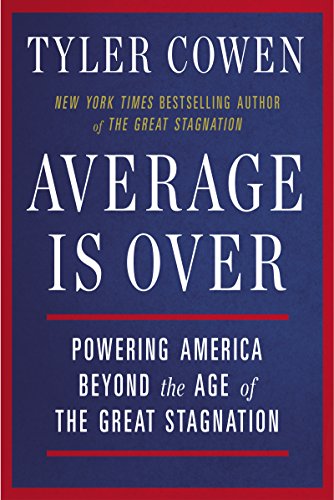
Renowned economist and author of Big Business Tyler Cowen brings a groundbreaking analysis of capitalism, the job market, and the growing gap between the one percent and minimum wage workers in this follow-up to the New York Times bestseller The Great Stagnation.
The United States continues to mint more millionaires and billionaires than any country ever. Yet, since the great recession, three quarters of the jobs created here pay only marginally more than minimum wage. Why is there growth only at the top and the bottom?
Economist and bestselling author Tyler Cowen explains that high earners are taking ever more advantage of machine intelligence and achieving ever-better results. Meanwhile, nearly every business sector relies less and less on manual labor, and that means a steady, secure life somewhere in the middle – average – is over.
In Average is Over, Cowen lays out how the new economy works and identifies what workers and entrepreneurs young and old must do to thrive in this radically new economic landscape.
Tyler Cowen: The Great Stagnation
Tyler Cowen shows us through economics that we may not be as innovative as we think we are and urges us to change.
Tyler Cowen | TEDx Talks on YouTube.
Average Is Over Quotes
“For the high earners, life will feel better than ever before, but at the same time life will feel more harried and more overloaded with information than ever before. These phenomena are in fact two sides of the same coin, and this tends to get overlooked.”
“It will become increasingly apparent how much of current education is driven by human weakness, namely the inability of most students to simply sit down and try to learn something on their own. It’s a common claim that you can’t replace professors with Nobel-quality YouTube lectures, because the professor, and perhaps also the classroom setting, is required to motivate most of the students. Fair enough, but let’s take this seriously. The professor is then a motivator first and foremost. Let’s hire good motivators. Let’s teach our professors how to motivate. Let’s judge them on that basis. Let’s treat professors more like athletics coaches, personal therapists, and preachers, because that is what they will evolve to be.”